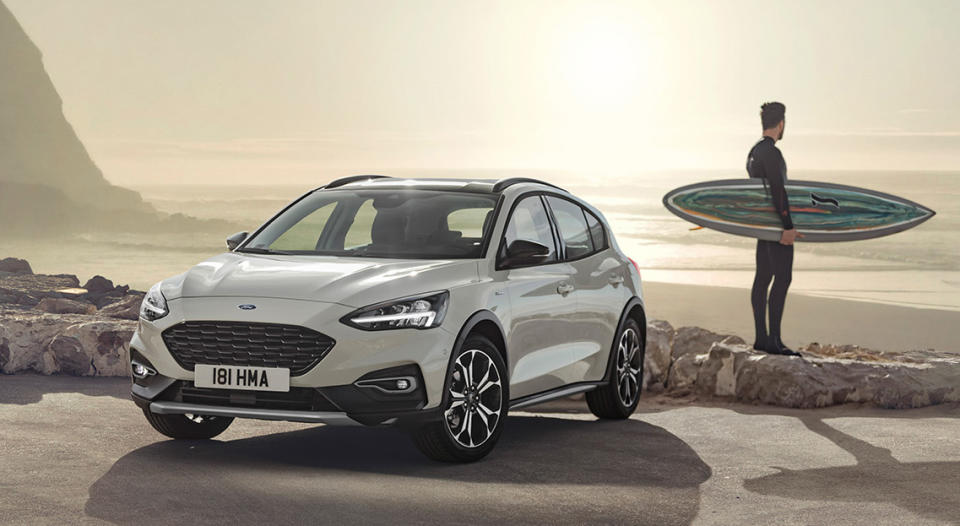This car is the poster child for Trump’s trade folly
President Trump wants Ford to lose money. And Apple to hike prices.
As Trump’s protectionist trade policy intensifies, inevitable economic distortions are materializing. And the Ford Focus subcompact has become the poster child for what can go wrong when politicians try to dictate what private-sector companies should do.
In 2016, Ford decided to move production of the Focus — the best-selling car in the world not so long ago — from Michigan to Mexico, to lower production costs and try to make a profit on a low-margin vehicle. The Michigan plant would produce higher-profit SUVs instead, and Ford would import the Focus from Mexico to the United States, at a lower cost than when it built the car in America.
In 2017, Ford changed its plans again and decided to move Focus production from Mexico to China, where it had a plant that could handle the task. Americans were losing interest in compact cars, and Ford was under mounting pressure to improve profitability. Moving the Focus to China would save as much as $1 billion in retooling costs and allow Ford to ship a new, SUV-like version called the Focus Active from China to the United States.

But with the Focus Active now subject to Trump’s 25% tariff on imports from China, Ford has decided to give up on selling the Focus in the United States completely. The factory in China will still produce the Focus for Asian markets, and another Focus factory in Germany will produce the car for sale in Europe. But Americans won’t be able to get the once-popular model, except on the used market.
Trump thinks the solution is to build the Focus in the United States. “This car can now be BUILT IN THE USA and Ford will pay no tariffs!” Trump tweeted on September 9. But Ford has already tried that, and lost money doing so. It might lose even more money if it tried again, because Trump’s steel and aluminum tariffs have pushed metal prices higher than they used to be. So Trump is basically encouraging Ford to ignore what it already knows about production costs and produce a vehicle with declining popularity, at a loss.
The basic logic of profit and loss
Trump, it’s worth recalling, fancies himself a business leader with insights into free enterprise that his predecessors in the White House lacked. Yet his trade policies violate the basic logic of profit and loss. And much worse seems to be coming, with Trump set to impose another set of tariffs on $200 billion worth of Chinese imports — four times the amount he has tariffed so far.
Apple recently said the next round of Trump tariffs “will result in lower U.S. growth and competitiveness and higher prices for consumers.” In a filing with the office of the US Trade Representative, Apple said the additional tariffs on Chinese imports will raise the cost of roughly two dozen types of products, including the Apple Watch, AirPods, HomePods, Beats, and a variety of components that go into other products.
Trump implored Apple, as well, to move production from China to the United States. “Apple prices may increase because of the massive tariffs,” Trump tweeted on September 8. “Make your products in the United States instead of China.” Trump is apparently unaware that in 2011, the late Steve Jobs, then Apple’s CEO, told President Obama that the United States didn’t have nearly enough engineers to support Apple’s vast assembly operations. He urged better efforts to lure engineers from other countries, and keep foreigners who study engineering in the United States at American companies, instead of letting them go back home once they get a degree. But Trump favors stricter limits on legal immigration, not looser ones.
Harley-Davidson is further along in its efforts to deal with the blowback of Trump’s trade wars. The company decided over the summer to shift production of motorcycles destined for Europe out of the United States to evade retaliatory tariffs Europe placed on imported U.S. motorcycles, in response to Trump’s steel and aluminum tariffs. Trump lambasted Harley, saying it “should stay 100% in America.” But again — he’s imploring the company to lose money. No CEO can or should do that.
The spectacle of Trump beseeching U.S. companies to act against their own interests — and their shareholders’—seems only likely to compound, since Trump has left himself little choice but to impose additional tariffs. China, so far, has shown no inclination to capitulate, and the country’s leaders may be stalling until after the U.S. midterm elections in November. If Trump’s Republicans lose control of one or both houses of Congress, it will be a repudiation of Trump in his own country, which will weaken his leverage in trade talks.
If Republicans prevail in November and retain full control of Congress, it could strengthen Trump’s hand in trade negotiations. But there’s a fatal flaw in Trump’s strategy: His tariffs, by necessity, will harm U.S. companies and consumers before they produce enough leverage to extract concessions from China. Trump is basically telling the American victims of his trade policy to buck up and take it. They’re saying no.
Confidential tip line: [email protected]. Click here to get Rick’s stories by email.
Read more:
Rick Newman is the author of four books, including “Rebounders: How Winners Pivot from Setback to Success.” Follow him on Twitter: @rickjnewman
